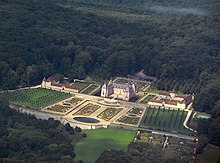Willy Manchot
Wilhelm (Willy) Julius Manchot (born July 10, 1907 in Würzburg , † October 24, 1985 in Düsseldorf ) was a German chemist and industrialist.
Career
After graduating from the Old Realgymnasium, today's Oskar-von-Miller-Gymnasium in Munich , Manchot studied chemistry at the technical universities in Würzburg and Munich. In 1928 he became a member of the Corps Vitruvia Munich. In 1934 he received his doctorate in engineering with a thesis on ruthenium carbonyls and nitrosyls . In the same year he joined Wacker Chemie's Ferrowerk Mückenberg / Niederlausitz to learn about the practical side of chemistry. There he mainly dealt with electrothermal processes. His technical talent, paired with commercial understanding, would later prove to be valuable during his work at Henkel .
Manchot joined the Henkel Group in March 1939. After a short time at the Henkel plant in Genthin , at the Stephan company in Halle and at Dreiring in Krefeld, he was appointed provisional chairman of the board of Deutsche Hydrierwerke AG on May 1, 1939 and was entrusted with the management of the Rodleben plant in Dessau. At that time, chemical research and the large-scale production of organic chemicals, especially fatty alcohols, were concentrated there.
On October 24, 1939, he was appointed managing director of Henkel & Cie GmbH (as the successor to his sick brother-in-law Carl August Bagel ) and a member of the board of Henkel & Cie AG. Together with Jost Henkel as commercial director, Manchot worked as a chemist in the company. Together they experienced the end of the war, the destruction, confiscation or dismantling of the factories in Germany and abroad. Like other executives and members of the Henkel family , he was arrested.
In 1948, after the family returned to the company management, Manchot, as chairman of the board of directors, played a key role in the rebuilding and business success of the Henkel company in the post-war years.
In the 1960s, his initiative and support resulted in numerous production facilities abroad. Other companies that appointed him to supervisory and advisory bodies also sought his advice. In addition, Manchot was a co-founder of the German Society for Fat Science .
Honors
- In 1964, the Technical University of Munich awarded Manchot the honor of an honorary senator for his services in promoting young academics and the university.
- In 1978, Federal President Walter Scheel presented him with the Federal Cross of Merit, 1st class, for his social commitment, for creating jobs and for his initiative to build factory estates .
Origin and family
Willy Manchot [mɑ̃ʃo], translated into German penguin , came from a Huguenot family in Lorraine . His father, privy councilor Wilhelm Manchot (1869–1945), held the chair for inorganic chemistry at the Technical University of Munich from 1914 to 1935.
Manchot had been married to Sigrid Henkel (1911–1966), a granddaughter of the company's founder Friedrich Karl Henkel , since April 3, 1935 , and they had two children together: Jürgen (1936–2004), who later became a chemist and u. a. Founder of the Pinguin Foundation and Susanne (* 1940).
After a fire in 1963, he had one of his residences, the Renaissance Montjeu castle from 1606 in the French commune of Broye in the Saône-et-Loire department in Burgundy , restored by his friend, architect Caesar Pinnau .
See also
Web links
- Company history of Henkel (1938)
- Financial register - portrait of Henkel
- Company history Matthes & Weber GmbH (1961)
Publications
- 1934 with Prof. Wilhelm Manchot : Presentation of ruthenium carbonyls and ruthenium nitrosyls. In: Journal of Inorganic and General Chemistry . Volume 226, 1936, pp. 385-415
swell
- ^ Philistine Association Vitruvia e. V. Munich, list of members as of January 1937, No. 459.
- ↑ a b Chronicle 130 years of Henkel. (PDF) Henkel KGaA, September 25, 2006, p. 51 , accessed on August 22, 2016 .
- ↑ uni-duesseldorf: Introduced: The Pinguin Foundation (accessed on May 31, 2014) .
- ↑ Ruth Pinnau: The victory over gravity. Caesar Pinnau in my life. Edition Leck, Berlin 1993, pages 208-211.
- ↑ Château de Montjeu - Historique (Dictionnaire des Châteaux de France, Bourgogne et Nivernais, p. 72, Françoise Vignier)
| personal data | |
|---|---|
| SURNAME | Manchot, Willy |
| ALTERNATIVE NAMES | Manchot, Wilhelm Julius (full name) |
| BRIEF DESCRIPTION | German chemist and industrialist |
| DATE OF BIRTH | July 10, 1907 |
| PLACE OF BIRTH | Wurzburg |
| DATE OF DEATH | October 24, 1985 |
| Place of death | Dusseldorf |

